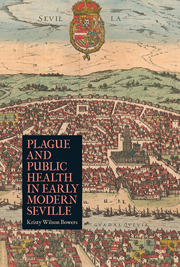Book contents
- Frontmatter
- Dedication
- Contents
- Acknowledgments
- Introduction
- 1 Early Modern Seville: Balancing Growth and Governance
- 2 Perceptions of Plague: Balancing Disease Concepts
- 3 Negotiating Public Health: Balancing the Individual and the Community
- 4 The Wider Politics of Public Health: Balancing Urban and Rural
- 5 City and Crown: Balancing Authorities
- Conclusion
- Notes
- Bibliography
- Index
3 - Negotiating Public Health: Balancing the Individual and the Community
Published online by Cambridge University Press: 05 October 2013
- Frontmatter
- Dedication
- Contents
- Acknowledgments
- Introduction
- 1 Early Modern Seville: Balancing Growth and Governance
- 2 Perceptions of Plague: Balancing Disease Concepts
- 3 Negotiating Public Health: Balancing the Individual and the Community
- 4 The Wider Politics of Public Health: Balancing Urban and Rural
- 5 City and Crown: Balancing Authorities
- Conclusion
- Notes
- Bibliography
- Index
Summary
Negotiating Exceptions
In the town of Castilleja de la Cuesta … Diego de Escobar, resident of the city of Seville and visitor in this town, … [states that] I have been in this town and the town of Manzanilla … more than ten days … and currently I am healthy and away from any danger of illness or contagion [I ask that] these witnesses I present be examined [to confirm this].
In late January 1582, Seville's city council sent word across one section of its tierra, the territory to the northeast known as the Sierra de Constantina, informing local leaders in the towns there of newly imposed restrictions on travel to the city. Those leaders in turn sent out town criers to announce the new restrictions in the public plazas, and city councilmen in Seville ordered similar announcements be made in the city. At each of the city gates around Seville, authorities notified guards and posted on public bulletin boards the names of towns newly declared suspect of harboring a plague epidemic. The towns of Constantina, La Puebla de Los Infantes, and Cazalla de la Sierra were now under suspicion, their residents and any goods from the area forbidden entry into the city. For many of Seville's residents, the news simply added to the worries of pestilence that seemed to swirl almost permanently through the area. For the previous two years, disease had stalked the residents of Seville and the tierra steadily, often diagnosed as catarro (catarrh).
- Type
- Chapter
- Information
- Plague and Public Health in Early Modern Seville , pp. 52 - 68Publisher: Boydell & BrewerPrint publication year: 2013

